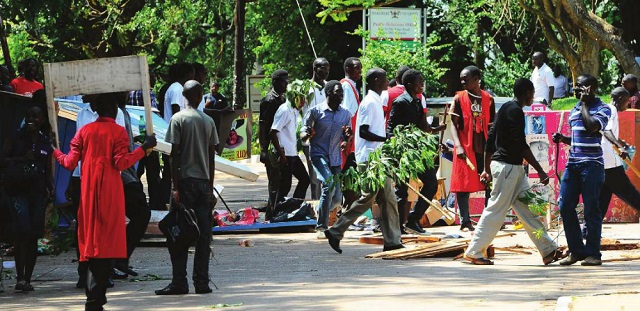
Makerere ready to explode?
August 06, 2016. On that date, will Makerere University Kampala re-open for its first Semester of the 2016/17 academic year? Uncertainty is the dominant mood on the sprawling campus of the nation’s oldest, biggest, and most prestigious institute of higher learning.
Everything is quiet as most of the students are away on holiday but the fate of the 33,000 students at both undergraduate and post-graduate levels is to be determined by how the university administration and the government handle a planned strike by non-teaching staff over a salary dispute, and how students react to a set of new stringent tuition payment rules.
The non-teaching staff members are warning of strike action starting Aug.01 unless their pay is raised and arrears from 2015 to the present are paid by the government. The total sum is said to be Shs 32 billion.
In the past, such issues have led to violent disruptions or strikes by students and even closure of the university usually at the opening of a new semester. In the mayhem, several students have been injured and property destroyed; in including looting from and destruction of businesses in the neighbourhood of the campus.
This time, according to the Uganda Police Spokesman Fred Enanga, the government is determined to avoid a repeat of the chaos even if it means delaying the re-opening of the university until the pending issues are resolved.
But the University Council Chairman, Prof. Charles Wana-Etyem says the university is going ahead with implementation of all recommended fees policies as the new semester begins next month.
So far, the leadership of the interim students’ guild appears satisfied with the new fees guidelines.
“The fees policy passed by Council is miles and miles better than it was and I believe it will avert strikes,” says Jothan Burobuto, the acting guild boss, who participated in their formulation. But he also quickly adds that he would have preferred the discussions to take place when campus was open and more students were involved.
Mwine Musa, a 4th year Civil Engineering student, was more concerned about the newly-admitted students.
“Some Ugandans will not afford to join the institution since the report maintains the current policy on payment by new students, even before issuing the admission letters,” he says.
But Amos Barigye, a social worker and a parent, praised the report. He said the payment installments suit him as a monthly salary earner with many children.
Although Makerere University is self-accounting and collects fees from self-paying students that it uses as it deems fit, it also gets grants from the government and foreign sponsors including institutions and governments. In the 2013/14 academic year, for example, the university got Shs 82 billion from the government, Shs 9 billion from foreign sources, and Shs 100 billion from fees and other sources.
The roughly Shs100 billion or Shs 120 billion (depending on how much is collected from paying students) is what is under contention with the university administration demanding complete autonomy to collect and use it. The government, on the other hand, wants to maintain an element of control and has been accused of failing to remit its contribution to the university in full and on time. This leads a substantial batch of students sponsored by the government to sponge-off the private self-paying students whose fees are used to run the university. The situation leads the university to be in a perpetual liquidity squeeze.
Shs 80 billion debt
The University is operating under a debt of Shs 80 billion, according to the chairman of its Finance, Planning and Investment Committee, Thomas Tayebwa. The debt has been growing over many years and comprises mainly arrears owed to suppliers and unremitted grants from the government. Last year, the Auditor General’s report for the year ended June 30, 2014 placed it at Shs 26 billion and Shs 12 billion the previous year.
Over the same period, the university failed to collect Shs 20 billion of budgeted internally-generated revenue. Some of the uncollected money – about Shs 4 billion or 20% – was uncollected fees from self-paying private students. The total uncollected internally-generated revenue had been just Shs 630 million the previous year.
A similar strike by the non-teaching staff members killed all activity at the university as they demanded salary arrears from financial year 2015/2016 and enhanced salaries for the 2016/2017 year.
This time, as last time, the non-teaching staff strike could target the central nervous system of the university, which includes operations of halls of residence, the registrar’s office, security, library, and support services.
As in the past, the striking staff could withdraw from providing services such as security and Information and Communication technology (ICT) support, and block custodians of university buildings, including halls of residence, from opening them. They could also block the registrar’s office from giving services to newly-admitted students due to report on Aug. 06.
Lecturers went on strike in 2013 demanding a 100% pay rise but they were negotiated down by the government after the university governing body, the University Council, refused to meet their demands. In a meeting with President Yoweri Museveni in 2014, it was resolved that salaries for teaching staff be raised and Shs 50 billion was subsequently allocated for the purpose in the 2015/16 budget. But the decision did not go down well with the non-teaching staff who felt they too deserved a raise. President Museveni subsequently agreed to raise the salaries of non-teaching staff also.
The government has been making forays into resolving the strike epidemic at Makerere.
 The Independent Uganda: You get the Truth we Pay the Price
The Independent Uganda: You get the Truth we Pay the Price



